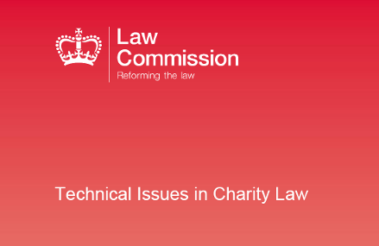The Law Commission has today published a report on technical issues in charity law and a new Draft Charities Bill, with proposed reforms to make running a charity easier and cheaper as well as confer new powers on the Charity Commission.
Technical Issues in Charity Law has been published this morning and is the result of an extensive consultation which began in 2015 with 40 proposals and was followed up last year with a supplementary consultation.
The Law Commission has made a number of recommendations, including giving charities more flexibility to obtain tailored advice, making it easier to amend governing documents and removing barriers to mergers.
It estimates that giving charities more flexibility over land sales could save the sector £2.8m per year.
Nick Hopkins, Law Commissioner, said: “Charities are a force for good and millions regularly donate to help others. But the rules that govern them have to be right.
“As it is, some of the technical law around charities is inefficient and unduly complex.
“Our reforms would help make sure charities use their time and money in the best way to support their good causes, whilst providing oversight to ensure public confidence.”
Other key recommendations
The Law Commission wants to widen the pool of professional advice for charities and recommends that fellows of the National Association of Estate Agents and fellows of the Central Association of Agricultural Valuers be included as designated advisers.
It also suggests loosening restrictions on permanent endowments, making it easier to make social investments and giving trustees a statutory power to borrow from their permanent endowment. Trustees would be able to spend up to 25 per cent of a permanent endowment as long as the charity recoups the expenditure within 20 years.
The Law Commission also suggests changes to remove bureaucracy where a fundraising appeal does not reach its total. It suggests that it should be easier for the Charity Commission to make a scheme enabling money to be used for other areas of the charity’s work.
It recommends extending the ability to pay trustees to enable them to supply goods as well as services to their charity.
The report says that charities should be able to make “small ex gratia payments” without needing to obtain permission from a regulator.
Ex gratia payments are payments made where there is no legal obligation and are often a gesture of goodwill. The Law Commissions suggest this should be used where there is a “moral obligation”.
The Law Commission says that charities with an income of more than £1m should be able be able to make ex gratia payments of up to £20,000 without authorisation. For charities with an income of between £250,00 and £1m it would be £10,000, for those between £25,000 and £250,000 it suggests £10,000 and for those with an income up to £25,000 it recommends being able to make payments of £1,000.
More powers for the Charity Commission
The Law Commission also recommends new powers for the Charity Commission, which would prevent organisations from using misleading names and give the regulator the ability to confirm if trustees were properly appointed.
It says that the Charity Commission should be given the power to delay registering a charity.
It also recommends a single set of criteria to decide changes to a charity’s purposes.
Charity Commission: ‘sensible and timely’
The Charity Commission said many of the recommendations were “sensible and timely” and said it expects to work with government to implement changes in the coming months.
Kenneth Dibble, Chief Legal Adviser at the Charity Commission, said: “Today’s report by the Law Commission makes a number of sensible and timely recommendations that focus on improving the regulatory framework under which charities operate.
“We have worked closely with the Law Commission throughout its charity law project, which supports our strategic priority of enabling trustees to run their charities more effectively and we hope will increase public trust and confidence.
“We will continue to work with government and other stakeholders to ensure that the impact of these changes are fully understood and would support government bringing forward the implementation of these proposals in the coming months.”
‘Could have a huge impact’
Lord Hodgson of Astley Abbotts, who chaired the 2012 review of the Charities Act, said that the recommendations could be transformative for the sector and said he hoped the government would act soon.
He said: “In my 2012 official review of the Charities Act 2006, I found that charities faced a number of historic obstacles under the current law. These unnecessary burdens on trustees act like barnacles on a boat, causing a drag when all should be plain sailing.
“Today's report from the Law Commission is important. Although its recommendations may appear to be highly technical, cumulatively I believe they would have a huge impact on the sector, helping trustees to work effectively in modern-day conditions.
"Since the recommendations have now been consulted on extensively and are approved of by the sector, I hope the government will find time to implement them speedily.”
Nicola Evans, charities counsel at Bircham Dyson Bell LLP and chair of the Charity Law Association’s working party response to the Law Commission, said the “recommendations are technical but important, with real practical consequences for charities” and that there is a “real opportunity to remove some of the complexity and inconsistencies”.
Carol Mack, chief executive at the Association for Charitable Foundations, also urged the government to act on the proposals “which will give charitable foundations greater flexibility in how they can use their resources for social good," she said.
“For example, enabling foundations to borrow from their endowments for large projects and giving them greater scope to make social investments. These changes will give foundations more choices about how best to use their assets to meet current and future needs. While technical, these changes have real potential and we urge government to implement them.”
Related articles











